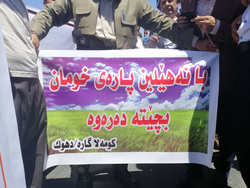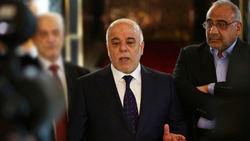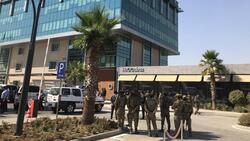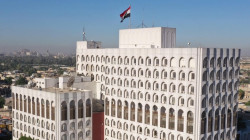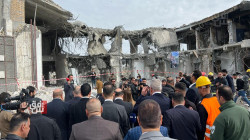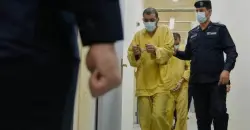Arrogance and fabrication after Iranian "rocket night" on Erbil
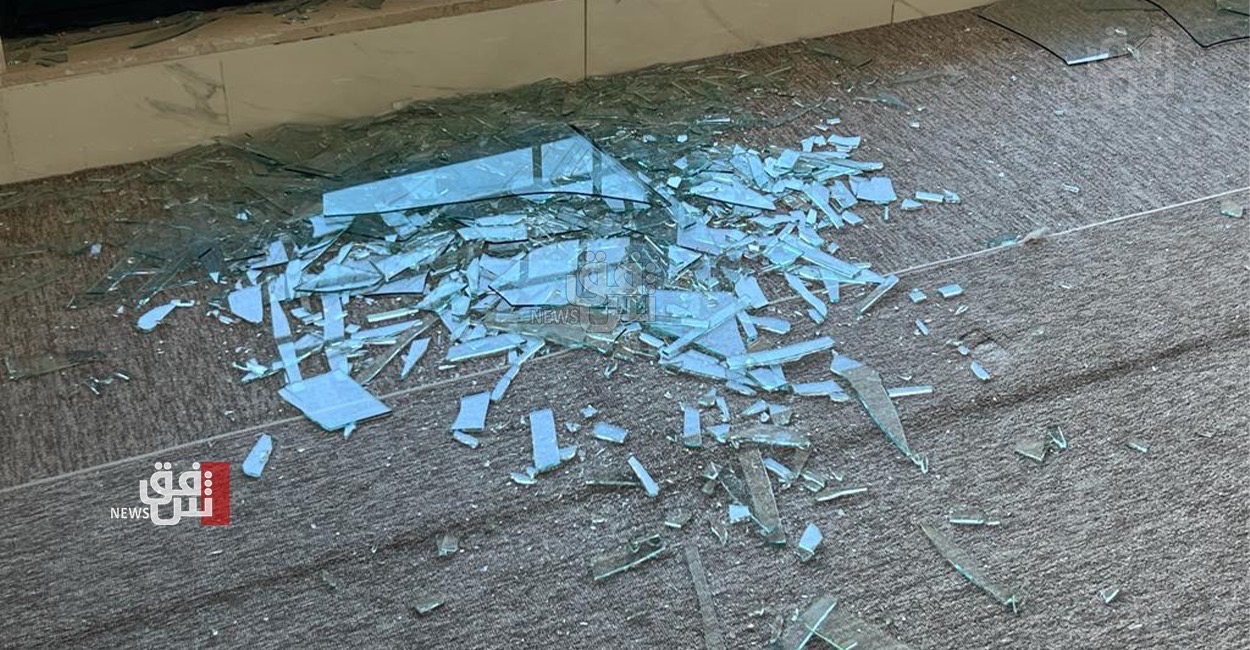
Shafaq News / The rockets launched by Iran at Erbil not only resulted in the loss of ten civilian lives but also dealt a blow to Tehran's credibility on both the Kurdish and Iraqi levels, as well as regionally. This was evident through Iran's propagation and dissemination of misleading narratives about the incident instead of acknowledging the truth and apologizing to the Kurdish and Iraqi citizens in general.
Escaping forward
Despite more than a week passing since the unexpected Iranian attack, with its timing, circumstances, and justifications, Iranian officials persist in claiming that the long-range missiles launched at civilian areas in Erbil were targeting "Mossad sites." However, Tehran has not provided any evidence or arguments to support this claim to either the Kurdistan Regional Government (KRG) or the Iraqi government.
The "escaping forward" policy pursued by Iranian officials regarding the attack on Erbil amounts to an implicit admission of the invalidity of their justifications and the failure of the missile aggression itself. This is especially apparent as it resulted in civilian casualties, including the prominent businessman Beshru Dizaee. The scene of his wife's anguish at the hospital sheds light on the harrowing events that unfolded inside their home at the moment the deadly rockets rained down on their family and guests on that fateful night.
Al-Araji was not exempted
Iraqi National Security Advisor Qasim al-Araji hastily visited Erbil at the head of a high-level security delegation coming from Baghdad just hours after the rocket attack. He affirmed that the claims of targeting a Mossad headquarters in Erbil "have no basis in reality," thus exposing and undermining Iran's narrative in front of both domestic and international public opinion.
However, this official response to the Iranian narrative prompted close circles to Tehran and Iranian media outlets to launch a campaign aimed at obfuscating the truth about the crime committed in Erbil. They immediately resorted to distortion and deliberate misinformation.
Observers suggest that this Iranian "escape forward", reflected first in the positions of the Foreign Ministry, for example, as well as in the media known for their ties to the Iranian government or the Islamic Revolutionary Guard Corps (IRGC), can only be interpreted from the perspective of arrogance when committing mistakes instead of admitting them. This was echoed in a statement by KRG’s spokesperson, Peshawa Hawrami, to Shafaq News Agency, asserting that "the prophetic saying 'pride leads to destruction' perfectly applies to Iranian officials as they insist on their false statements, disregarding the Iraqi, Iranian, regional, and global public opinion." He added that "what the IRGC did was a crime against civilian citizens in the Kurdistan Region (KRI) and a blatant violation of Iraq's sovereignty and the principles of neighborliness, international norms, and agreements."
Instead of acknowledging this "violation" of sovereignty and the principles of neighborliness, some Iraqi parties that consider themselves supportive of Iran tried to discredit Qasim al-Araji himself by making irrelevant insinuations about his origins or identity, rather than addressing the core essence of his response that "the Iranian claims" regarding the targeted residence, which was found to house children and civilians, "have no basis."
However, this behavior towards a figure like Qasim al-Araji and the nature of his role, simply because he stated the facts within the context of an intention to defame, did not provide a clear exoneration for the entities that ordered and carried out the strikes on civilian homes in Erbil. They resorted to a more absurd method, as observers say, represented in fabricating images and information using "Photoshop" technology to distort the image of the victim himself, namely Beshru Dizaee, through a fake image showing him with a Jewish rabbi, in an attempt to insinuate his connection to the Israeli Mossad.
This defiance, which has sparked outrage among Iraqi citizens in general and Kurds in particular, in response to what KRG described as a "major crime," has led thousands of citizens in KRI to participate in protests on Monday and last Thursday, condemning the Iranian aggression. Additionally, Iraqi and Kurdish officials canceled meetings that were scheduled with Iranian officials, similar to what occurred in Davos with Iranian Foreign Minister Hossein Amir Abdollahian. Meanwhile, calls for boycotting Iranian products are increasing after the Chamber of Commerce in Erbil issued a call for it.
Iranian confusion
While Iranian officials assert that they will not hesitate to defend their national security after the bombing attack in Kerman on January 3rd, according to leaks to a global news agency, observers wonder why Iranian officials first chose to directly address Israel rather than Erbil in their response. Secondly, they question why Tehran waited for about two weeks after the Kerman incident. Thirdly, considering the smooth channels between Iranian security and military authorities and their political and security counterparts in Erbil or Baghdad, why didn't Tehran, in line with diplomatic relations and "neighborly" ties, opt to rely on these channels for information exchange and verification with Iraqi and Kurdish authorities regarding the nature of the allegations, instead of resorting to a policy of reckless missile strikes?
The Salary guillotine
Political sources in Iraq and KRI warn that the worst aspect of Iran's policy of defamation and misinformation regarding the "missile crime" is that the same Iraqi entities affiliated with the Iranian "neighbor" are also resorting to tactics beyond "photoshopping" to engage in further deceit and extortion. They are threatening to manipulate the issue of salaries allocated for Regional employees, seeking to bring it up for discussion and tighten control within the federal parliament. This reflects an additional disregard for the lives and livelihoods of the Region's citizens.
Ironically, as observers note, while some Iraqi political and media entities colluded with the missile aggression on Erbil, no country or entity worldwide supported it. Instead, it garnered a long series of condemnations and denunciations from regional and international capitals, viewed as an unjustified departure from presumed good neighborly relations. Thus, Iranian behavior suggests that it treats these relations as nothing more than "photoshopped" images, devoid of substance.
Not the first time
On January 8, 2020, Iran shot down a Ukrainian passenger plane, a Boeing 737-800, en route from Tehran to Kyiv, resulting in the deaths of all 176 people on board, including 82 Canadians, 63 Iranians, and 11 Ukrainians.
Initially, Iran claimed that the plane was shot down by a surface-to-air missile launched by American forces, but later admitted that it was shot down accidentally.
The downing of the Ukrainian plane sparked outrage worldwide. Many countries condemned the incident, describing it as "an act of terrorism."
Iran officially apologized to the affected families and announced measures to prevent such incidents from recurring.
Analysis of Iranian errors in its missile attacks on Erbil:
Lack of precision in targeting: Investigations have revealed that Iranian missiles did not target an "Israeli Mossad headquarters" but instead fell in civilian-populated areas, resulting in civilian casualties. This indicates that Iran directly or indirectly targeted civilians.
Violation of Iraq's sovereignty: Iran conducted its bombing without any coordination with Baghdad or KRI, constituting a violation of Iraq's sovereignty. The Iraqi government and KRI condemned the attack, describing it as a "blatant aggression."
This Iranian behavior can be interpreted for several reasons:
- Desire to terrorize civilians: Iran may seek to terrorize civilians and send a message to the world that it is capable of striking targets anywhere in the region.
- Response to international pressure: Iran may be attempting to respond to international pressure due to its nuclear program and interventions in the region.
- Quest to demonstrate strength: Iran may be seeking to demonstrate its strength to its adversaries, including Israel and the US.
